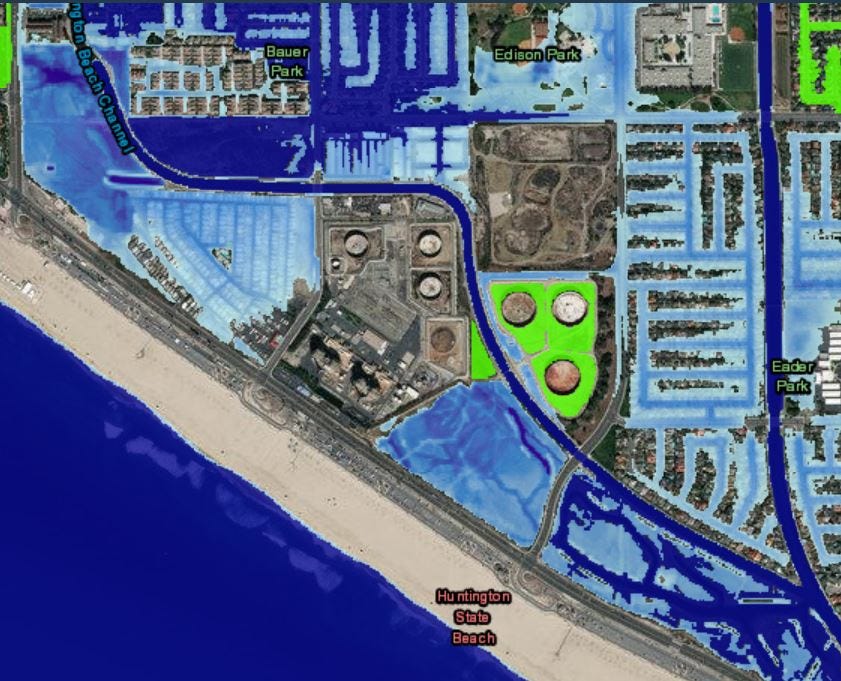Climate Change Could Swamp Billion-Dollar Desal Deal
Note: The Surf City Voice website was destroyed by hackers in December, 2019 and is under reconstruction. This story was first posted June 25, 2018.
By John Earl
Poseidon Resources and the Orange County Water District may have hit another set of self-inflicted hurdles in their quest to build a billion-dollar ocean desalination plant in Huntington Beach.
The potential setbacks include extreme flooding caused by global warming along with downsizing the desalination plant or removing it altogether, according to a recent email to OCWD staff from the California Coastal Commission’s chief scientist, Tom Luster.
State of California: Sea Level Rise Guidance 2018
In that email, Luster describes several project components that may need changing to earn the Commission’s approval. That, in turn, could impact parts of a proposed revised term sheet negotiated between Poseidon and OCWD board members over the past 2½ years in a series of closed-door committee meetings exposed by the Surf City Voice.
On June 6 the full OCWD Board of Directors postponed a vote on the term sheet until July 18 after public speakers complained about being kept out of the loop by the “ad hoc” committee and asked for more time to respond.
The list of term sheet glitches is daunting, if not fatal.
Poseidon must change the project layout to create a100-foot buffer between the plant and adjacent wetlands habitat. “It’s unclear at this point what changes Poseidon will make to meet that requirement,” the letter states. “A more compact project footprint? A smaller facility with lower production levels? Increased building heights?”
Poseidon must conduct a “geotechnical (subsurface) investigation” at the site, and that requires removing old fuel-oil tanks. “That investigation could result in a different facility layout…or other changes.”
Poseidon will probably have to change its pre-treatment plan to avoid chemical overloading of the groundwater basin, which could alter the project design or layout.
During the proposed 30-35 year contract term, the plant “will likely be inundated [by flooding], either short-term (due to higher tidal ranges, storm surges, etc.) or permanently, depending on the rate of SLR (sea level rise) and the response of the area’s existing high groundwater table.” Then Poseidon would have to “remove all or part of the existing exterior berm around the site.” Far worse, “the facility may have a more limited operating life than is contemplated in the Term Sheet, and may reduce the benefit of the Term Sheet provision that would allow OCWD to purchase the facility at the end of the 30– 35-year contract.”
Regulations limit repairs of damage caused by coastal hazards (as called for in the term sheet) and “that could require removal of all or part of the [billion-dollar] facility.”
The Commission “may require Poseidon to provide a performance bond to ensure the facility can be removed when needed, which may have an effect on the Term Sheet or the expected project costs.”
Contrary to claims by Poseidon and OCWD’s staff, Poseidon needs more approvals than the two permits (from the State Water Resources Control Board and the Coastal Commission) it claims it needs to advance the project.
Poseidon needs several other approvals, according to Luster:
A State Parks easement for use of seawater intake pipelines.
Proof that easement holders and landowners along the first mile of the distribution pipeline. have a legal interest.
“Possibly a modified Conditional Use Permit, Owner Participation Agreement, and Franchise Agreement from the City of Huntington Beach to reflect changes in the project distribution system since their original issuance in 2010.”
If OCWD and Poseidon share responsibility for the distribution system and if the District has a buyout option, as called for in the term sheet, “OCWD would need to either share or take on full responsibilities for meeting permit conditions.”
But permitting has always been a weak link in the District’s self-proclaimed partnership with Poseidon.
NOOA photo from https://coast.noaa.gov/digitalcoast/tools/slr
OCWD staff and board members always rally for Poseidon at board meetings and State permit hearings, but their inability to find long-term buyers for the high-price desalinated water precludes taking responsibility for the project they relentlessly pushed for the past five years.
Joe Geever, a consultant for Residents 4 Responsible Desal, says that the District is wasting the State’s time by not formally partnering with Poseidon. “They are forcing state agencies to spend an enormous amount of time and effort reviewing permit applications for a project that may not ever happen; because at the end of the day, Poseidon can’t show they have a willing partner.”
OCWD’s Chief Engineer, John Kennedy, was cautiously optimistic when asked if the issues raised in the letter would cause the OCWD board to delay consideration of the revised term sheet.
“I doubt this will cause any delays,” he said. “The term sheet is not meant to have every detail resolved.” Nevertheless, Kennedy said, he and General Manager Mike Markus will assess the letter next week.
Kennedy also said that staff will wait until after the OCWD board approves the project’s distribution system to analyze its effect on Poseidon’s franchise agreement with Huntington Beach, which guarantees the city various disputed economic benefits.
Before that can happen, OCWD must find enough buyers for Poseidon’s high-priced water. But the achievement of that goal is preceded by 15 years of back to back failures, first by the Municipal Water District of Orange County and then OCWD.
In the meantime, the likely loss of benefits promised to the City of Huntington Beach will be a hot topic on local social media platforms, where opposing Poseidon has become a bragging right of some leading candidates for city council.





